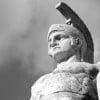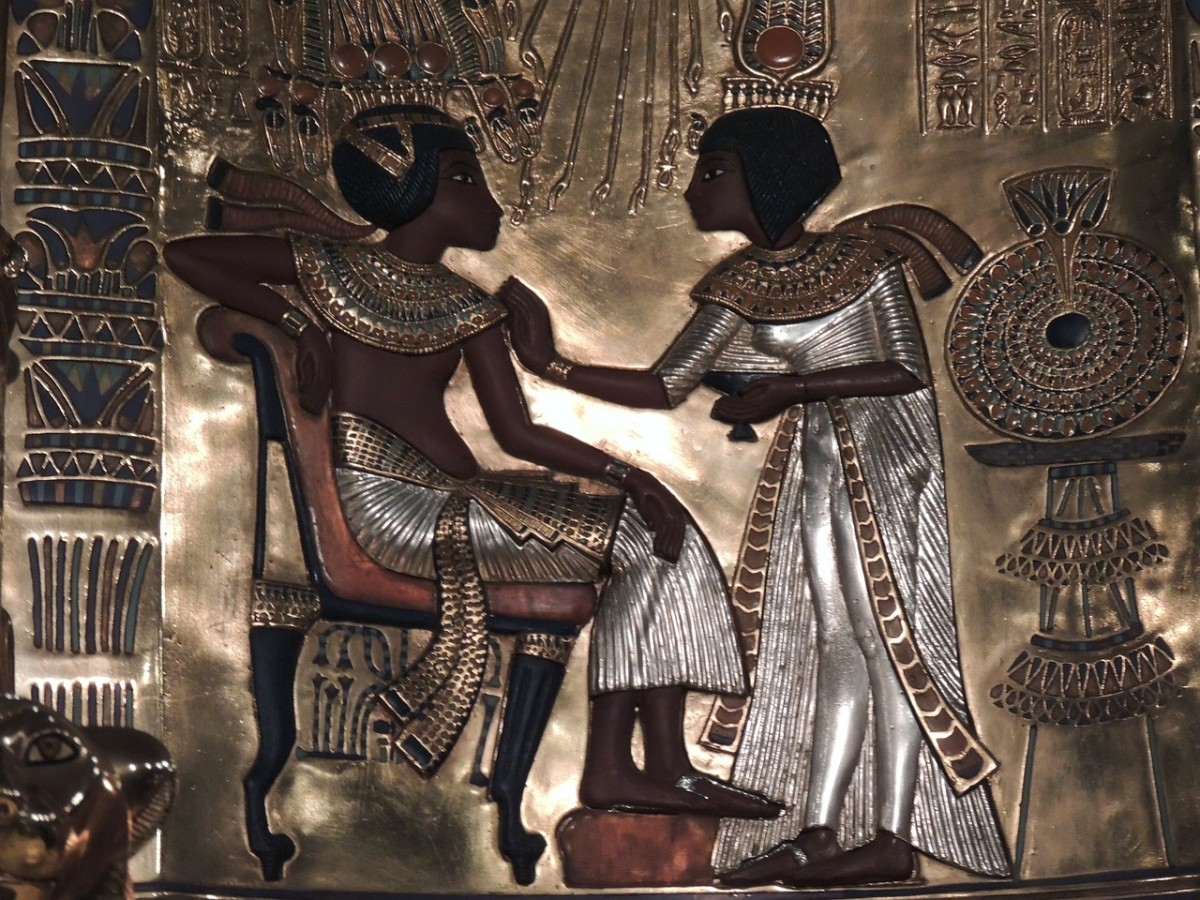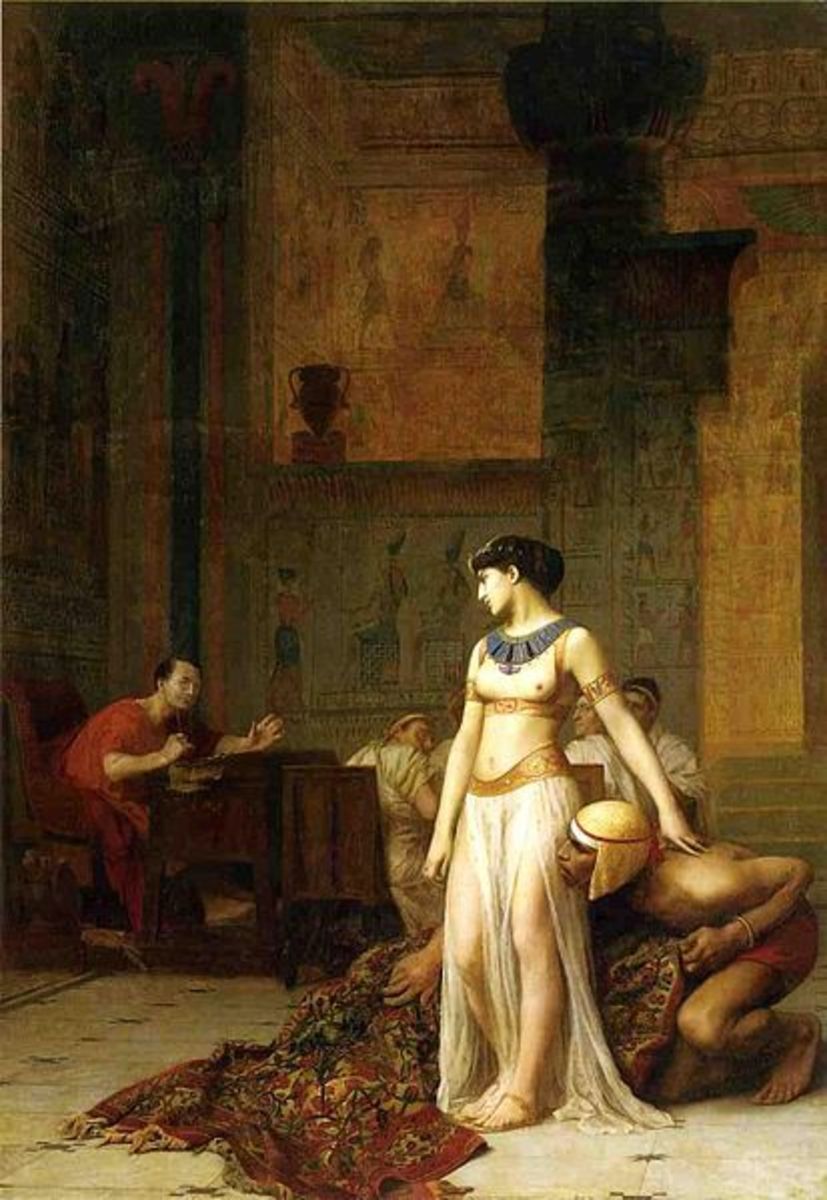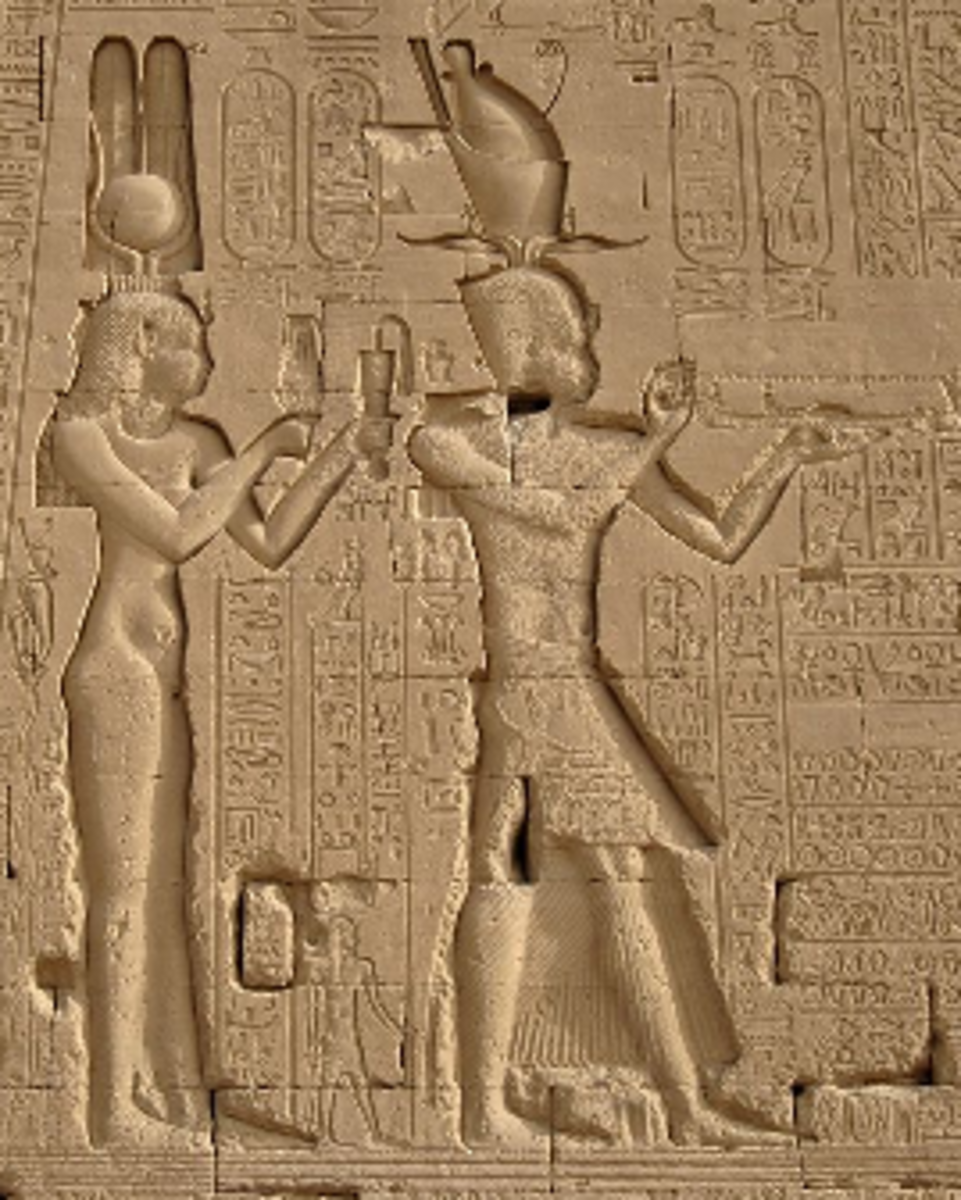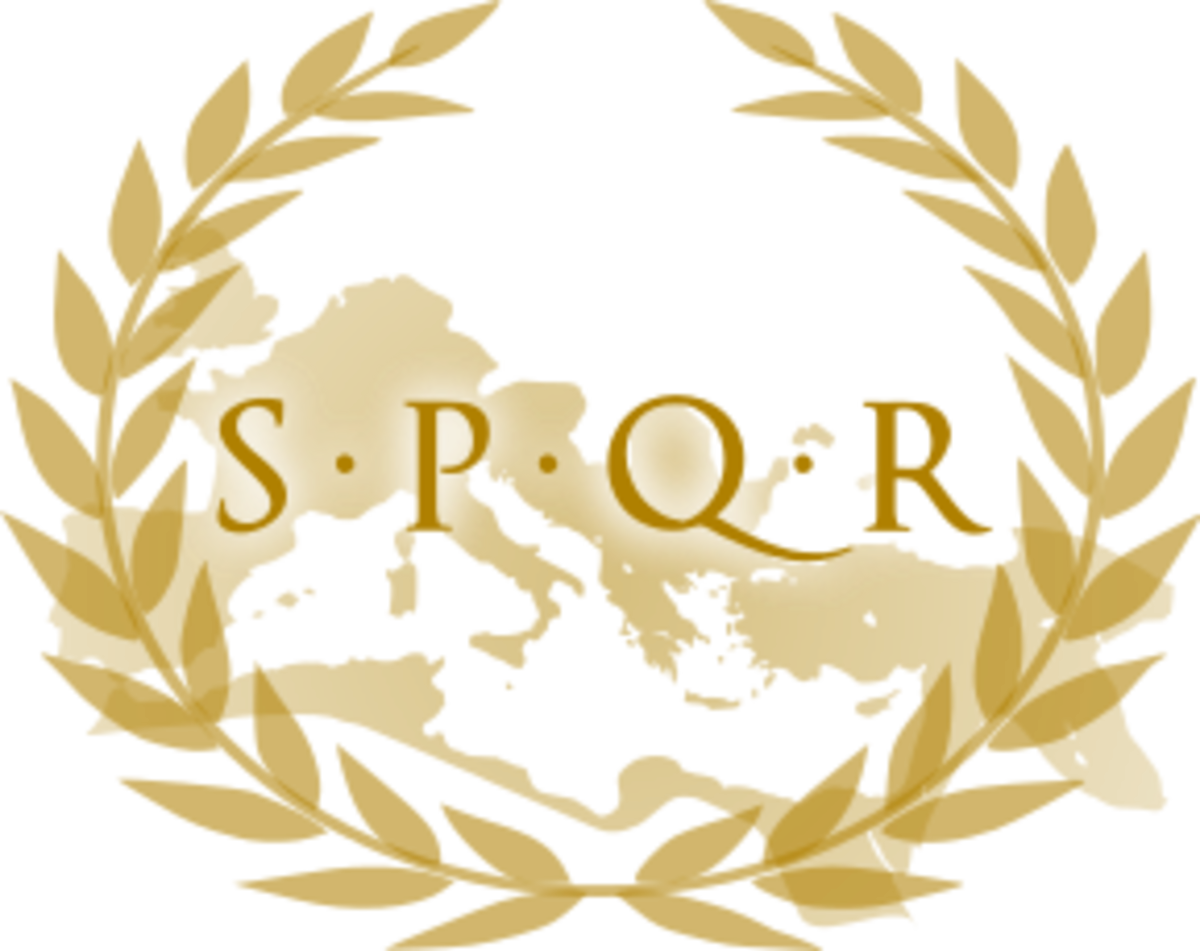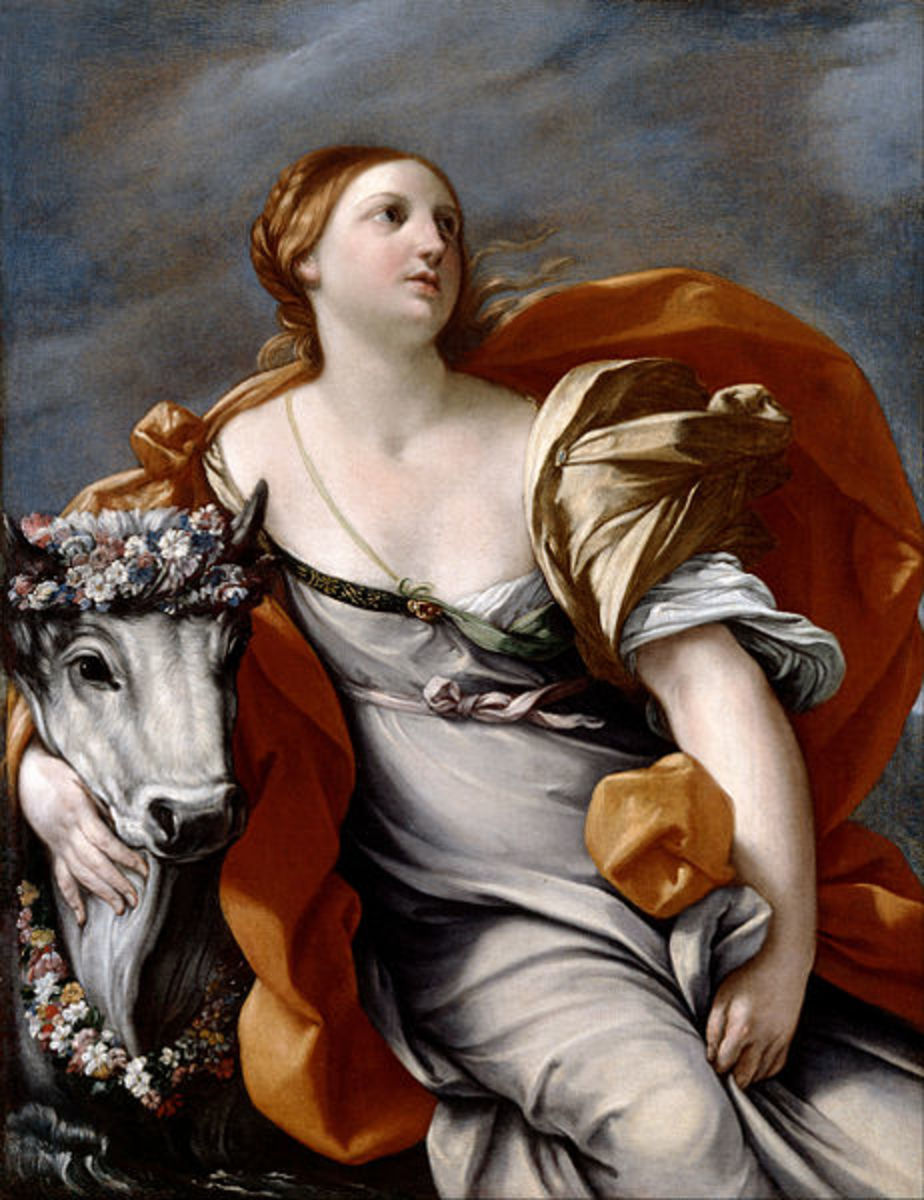Cleopatra
Cleopatra was the throne name of a number of Macedonian queens of ancient Egypt, the most famous of whom was Cleopatra VII Philopator (69 - 30 B.C.).
Although she ruled in Alexandria, she was part Macedonian; part Greek and Iranian. In the history of Egypt, Cleopatra is of small importance; she was merely the last of the degenerating Ptolemaic line, which had become accustomed to governing with the aim of exacting as much revenue as possible without causing revolt.
Her fame comes from the West: as mistress and wife of Mark Antony she played a decisive role in the course of Roman, and hence subsequent European, history.
Cleopatra and Caesar
In 51 B.C., in accordance with the will of their father Ptolemy XII Auletes, Cleopatra and her young brother Ptolemy XIII ascended the throne as joint rulers of Egypt. From the first, the young queen showed a strong will to power, and she struggled with her brother and his supporters for complete control of Egypt. At first unsuccessful, she was exiled from Alexandria (in 49 B.C.). While she was preparing an army to regain her throne, Julius Caesar arrived in Egypt to settle the succession and attempt to gain Egypt's wealth for Rome. Cleopatra re-jturned to the capital in secret and secured Caesar's support; hence, after Caesar had won the Battle of Alexandria (47 B.C.) and Ptolemy XIII had died, she found her position secure. Tradition forced her to take her youngest brother, Ptolemy XIV, as her husband and cosovereign, but Cleopatra was now the effective ruler of Egypt. During several months of rest for the Roman army, she showed Caesar every pleasure and luxury, including a journey up the Nile. It appears that she now began to plan for wider power - as first lady of the Roman world.
Cleopatra's position was consolidated when (in 46 B.C.) she bore Caesar a son, who was called Ptolemy Caesar or Caesarion. Soon afterward she went to Rome, where she was received with honor, although Caesar greatly offended his countrymen by dedicating a golden statue of her in the temple of Venus Genetrix. Provided with a residence on Caesar's property beyond the Tiber, Cleopatra remained in Rome until a month after his assassination in March 44 B.C., when she fled to Alexandria. Ptolemy XIV died, presumably poisoned by her order, and she placed her son with her on the throne as Ptolemy XV Philopator Philometor. (She had made him acceptable at birth to rule in Egypt by having him recognized by the priests of Hermonthis as a son of the god Arnon.)
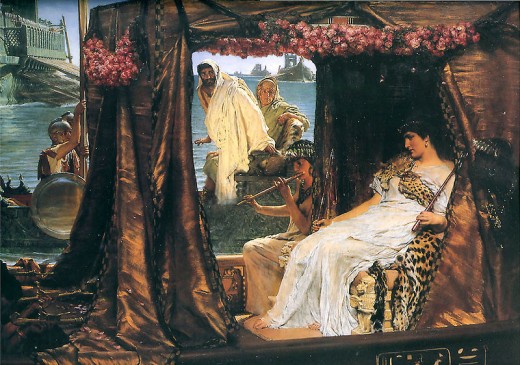
Cleopatra and Antony
After the Battle of Phillippi (42 B.C.), Mark Antony (a member of the ruling triumvirate with Octavian and Lepidus) called Cleopatra and other Eastern rulers to Tarsus to render account to him. Cleopatra now saw her second great opportunity for world power and fame. In a carefully staged encounter, she used all her wealth, charm, and wit to excite the interest of this passionate man. Not only was she acquitted of a charge of assisting Cassius (one of Caesar's assassins) against the triumvirate, but she soon had Antony granting her every request, even to ordering the murder of her young sister Arsinoe (a barely possible contender for the Egyptian throne), who had taken asylum in the temple at Ephesus. A few months later she received him as her paramour in Alexandria. There during the winter of 41 - 10 B.C. she made herself indispensable to him as mistress of ceremonies, companion, and confidante.
After a long separation, Antony sent for Cleopatra in the autumn of 37 B.C. to join him in Antioch. There they were married, although Antony was already wedded to Octavian's sister, Octavia, and a polygamous marriage could not be recognized under Roman law. Antony acknowledged as his the twins Cleopatra had borne, Alexander Helios and Cleopatra Selene. In addition, he gave her a considerable part of the territories of central Syria, the island of Cyprus, much of the Phoenician coast, properties in Judaea, and the land east of the Dead Sea in the Nabataean kingdom. Together they planned his next campaign against Parthia. Then, pregnant with Ptolemy Philadelphus, Cleopatra returned to Egypt, but her hold on Antony continued to grow. She led him to insult Octavia, who had been forbearing and staunch in her support of her faithless husband. She outraged Roman pride by persuading him to celebrate a triumph in Alexandria and allow her participation in it (34 B.C.). The honors and favors Antony heaped upon Cleopatra and her children and his acquiescence in Oriental modes of behavior led to scandalous gossip and charges (some true, some false) that progressively alienated his officers and his supporters in Rome until he lost his reputation and was stripped of his powers.
Eventually Cleopatra accompanied Antony everywhere, even in the field, becoming his most trusted counselor. It was against Cleopatra that Octavian finally declared war in 32 B.C. When the two commanders met at Actium in 31 B.C. to decide who should rule the Roman world, it was Cleopatra's plan of battle that Antony used. And when most of his fleet defected, it was in her ships that he fled. Instead of following him to Alexandria, his army surrendered.
Antony's spirit was broken, and it soon became clear to Cleopatra that her dreams of power could no longer be achieved through him. Nor could they be achieved by an Egyptian war against Octavian. Both Antony and Cleopatra unsuccessfully attempted to negotiate with Octavian, who eventually took Pelusium and then Alexandria. According to tradition, Cleopatra provoked Antony's suicide by allowing him to believe she had killed herself. After his death she attempted once more to treat with Octavian for the rights of her children. When she was satisfied that she could obtain nothing, she killed herself. However, she was foiled in a plan to immolate herself and all her family treasure, which she had collected in a mausoleum where she then barricaded herself with two trusted companions. Legend has it that she was detained in conversation at the entrance while a Roman soldier forced a high rear window. From then on she was a prisoner; and almost certainly Octavian acquiesced to her suicide (30 B.C.). This was probably accomplished through the bite of a cobra smuggled to her in a basket of figs. She was buried beside Antony in accordance with a last request. Cleopatra's death brought the 300-year old Ptolemaic dynasty to an end, and Egypt became a Roman province.
This content is accurate and true to the best of the author’s knowledge and is not meant to substitute for formal and individualized advice from a qualified professional.
© 2009 Historia
